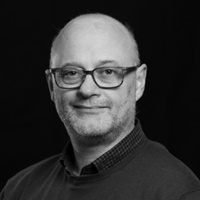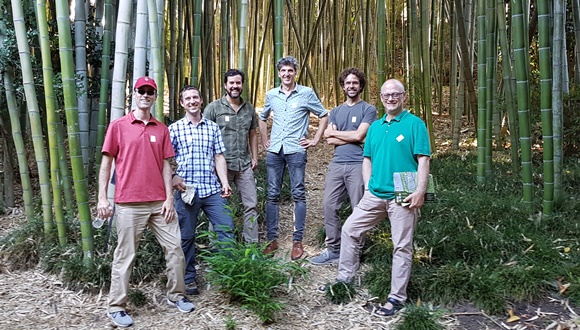Maurizio Mencuccini, the nomadic scientist
Maurizio Mencucini's taste for constant itinerancy was awakened by a professor at the University of Florence, who constantly pushed his students to leave Italy. Today he recognises that to do so "a certain daring is needed, but over time you realise that opportunities open up". And, he adds, "it's something I tell my children every day".
What made this renowned Italian scientist based at CREAF a nomad was also his drive, curiosity and great willingness to learn. After working as a researcher in Scotland, the United States and Australia, he came to CREAF for a sabbatical year thanks to a grant from the Catalan government for active foreign scientists. The experience "gave me the chance to see how CREAF and science in Spain worked, which I was completely unaware of. And it confirmed the impression I already had about the good quality of Catalan science".
"A sabbatical year at CREAF while I was working at the University of Edinburgh confirmed the impression I already had about the good quality of Catalan science"
His broad vision and intense involvement with diverse projects and teams have allowed him to forge increasingly solid professional relationships and closer ties, which often provided the next opportunity for growth. "We have never lived in Florence again", he recalls, "we are only going to visit", referring to the family that he has created with his Italian partner, whom he is grateful for having accompanied him on these pilgrimages. His journey began just after graduating in forestry science in Italy, one summer when he decided not to take a vacation and went to the University of Edinburgh to collaborate with a group of researchers he had just met at the University of Florence. And it continues with stable periods both in Scotland, as in the United States, Australia and Catalonia, where in 2013 he established himself at CREAF as an ICREA researcher in forest ecology and ecosystems.
Generosity and public service
Edinburgh was the gateway to working with the team of Paul Jarvis, John Grace and Douglas Malcolm. "They were pioneers at that time and set the path for our generation and the next," he acknowledges. The Edinburgh experience completely reverses his perception of science and lays the foundation for a resounding belief in what collaboration between scientists is all about. After all - without actually saying it in these words - he speaks of humility, generosity and public service.

"I learned the importance of reconciling competence and teamwork by working with Paul Jarvis, John Grace and Douglas Malcolm. It was a great human lesson in how scientists relate to each other". Photo: ICREA.
MAURIZIO MENCUCCINI, ICREA researcher at CREAF.
"Obviously, they were 3 great brains in competition, with very different ideas about how to carry science, but with an exceptional capacity to think together and with a magnificent point of collaboration," he explains with evident appreciation. "I learned how important it is to reconcile competition and teamwork. It was a great human lesson about how scientists relate to each other. And I want to emphasize that this was a characteristic of that environment, which is still typical of the University of Edinburgh".
A happy island
Today, the classrooms of the Scottish city that shook Mencuccini still exude a way of doing things, even though they have evolved. "Today, research groups are managed differently and there are many more women, for example. But there is still group dialogue, collaboration, and science is understood as work between multidisciplinary groups. Edinburgh was always a happy island and that is unusual”. And if you ask Maurizio Mencuccini how this attitude was achieved, he says that it is probably a personal characteristic and, besides intelligence, one has to be interested in something that goes beyond the personal.
The effects of changes in CO2 concentration on forests were the focus of research at that time for the research group at the University of Edinburgh with whom he was working, as well as the analysis at continental scales of the impacts of climate on the plant physiology. An objective practically the same as that of Forgenius, today, the European project that Maurizio Mencuccini shares with the CREAF researcher and UAB professor Jordi Martínez-Vilalta. "It's amazing how some issues are still so relevant...". Currently he continues to collaborate with research carried out from Scotland, promoting science and the people involved and, in addition, he is co-editor with John Grace of the publication Plant Ecology & Diversity.

The collaboration with Jordi Martínez-Vilalta was the embryo of Mencuccini’s arrival at CREAF. "We got on very well but unfortunately he didn't stay long, because he had a stable offer from CREAF... that's what happens with the good ones, they don't stay long," he recalls. At that time, he also worked with other CREAF scientists such as Josep Piñol and Rafael Poyatos, who was studying for his doctorate with Pilar Llorens.
Gender and science
The low presence of women in the scientific career is a deficiency that it detects and, again, the comparison is natural. "Certainly when I returned to Edinburgh years later there was a clearer gender balance than in many Mediterranean institutions. And now even more." And he admits that "in the scientific field I have worked a little with some female colleagues, but not as much as I would have liked".
"Not publishing is unethical, but I think it is wrong to be driven by indicators. After all, publications are instruments for communication between scientists. Therefore, science and questions first, and then publications."
Publishing is also a core of his speech. He emphatically asserts that science costs a lot of public money and that you have to publish, give lectures and talks to be held accountable. Therefore, he assures that "not publishing is unethical", although he further clarifies that it seems wrong to follow the publication indicators. "I like science but, after all, publications are instruments for communication between scientists. Therefore, science and questions come first, and then publications."
The desire to stay permanently as an ICREA researcher at CREAF was gestating over 3 years, during which time he kept going to and from Barcelona to Edinburgh. "In the end, one moves to continue doing good science", he reflects, "and what is lost, which is basically the high level of British funding, is compensated with aspects such as the environment or other collaborations". When asked how he relates to a new organization, he points out that he puts all his efforts into promoting new practices that help improve, according to his path. "You have to get a little involved in management so that the institution improves and this is done by listening, seeing if it can be useful to contribute your own experience, participating in the cloisters, taking part in evaluation commissions and discussing ideas and future projects."
Understanding that a scientific career implies mobility is a risk, which Mencuccini is quick to clarify. "It is not necessary, but it is an opportunity to know other ways of doing things, to open the mind and the interest to work with new and superior people".
This action is part of the Severo Ochoa “ULandscape” funded in 2019 by the Agencia Estatal de Investigación of the Spanish Ministry of Science and Innovation to support Research Centres of Excellence.







